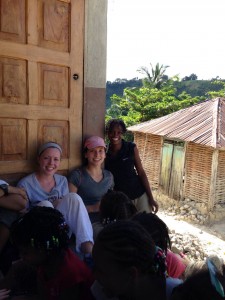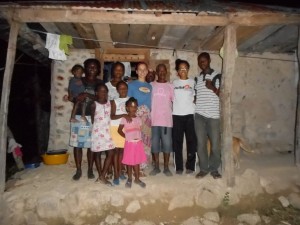VHP Student Spotlight: Michaela Coplen
May 2, 2015 by pasinha
The following is an interview conducted with Michaela Coplen, a fellow VHP’er! She shares how her prior experiences led her to the Vassar Haiti Project, along with a poem that she wrote in honor of her trip to Gerin, Haiti.
Jenga, by lantern light
for the people of Gerin, Haiti
Nearby mamá learns a tree timber to bend around her body
and girls fill the spaces between their teeth with coconut and smiles.
In the square, a widower wills new life into drying leaves
and a man does business with the shadows of his hands.
Nearby the sun settles itself into a cradle of palm and promises,
and the village boys outrun their own nakedness.
Nearby a dog begs to be heard,
nearby where the bread scarcely rises.
In the distance, a man traverses the mountain trail
as if he hasn’t given up yet;
a dream falls in the jungle and it doesn’t make a sound.
Nearby a donkey negotiates the terms of its surrender,
and a goat looks wistfully at the rope around its neck.
In the dark, an ocean tries to figure out how it feels to be forever;
the waves teach their children to return, return.
Nearby a rain cloud gathers,
bruised and the color of love.
Inside, a woman latches her door against the moon.
I watch as my sisters
build lace out of blocks of wood,
and I learn the regular pattern of absences,
the size of the spaces between,
the things lived without
within this tentative tower,
the sighing, inevitable fall–
the flurry of hands
rebuilding.
1. How did you find yourself in Gerin, Haiti? (…and you may interpret “find yourself” in whatever way you’d like :)).
I was a member of my school’s Model United Nations team, and our mentor believed that it was important to find ways to apply what we learned in MUN to the real world. One way that we did this was through extensive fundraising for an organization called buildOn—a non-profit dedicated to bringing education to every child, in communities around the world. Our school chose to raise money for buildOn’s project to build a school in Gerin, Haiti. Our fundraising was so successful that buildOn invited two students to join them for the first week of the school’s construction—I was lucky enough to be chosen as one of those two.
2. So often, the international development industry portrays poor communities in terms of all the things they lack, which can falsely box them into perpetual inferiority – always developing, but never quite developed. Your poem speaks to this sense of lack (“absences,” “spaces between,” “the things lived without”), but sees more in it than what the international development industry does. Please tell us more about the richness you encountered in Gerin. Did it surprise you?
Gerin is incredibly rich in humanity. While we were working on the construction site, we stayed the nights with host families—I was surprised by how easily they made me feel truly like family. After a long day of work, my host brother would bring a bucket of water up from the river (about an hourlong trip) for me to bathe, and then my host sisters would brush and braid my (and each other’s) hair while I helped my host mother grind corn. As the sun set, we would gather around a table and play Jenga or card games. Lamp oil is expensive, and they had very little, yet they insisted on lighting a lantern every night so that we could prolong our games a little bit longer into the night. The country and the people are beautiful, in all senses of the word. However, something that I tried to avoid in the poem and in my mind was the romanticization of poverty. Haiti and her people are so remarkably resourceful, and rich in their kindness—but still in dire need of things that every human should have: access to fresh water, nutrition, health care, education, etc. What makes the people really rich is the incredible tenacity they have to overcome all of this, and remain so generous in their spirit.
Michaela and another Carlisle High School student on their trip to Gerin, Haiti, with one of the women on the school board who helped start the building project. The girls in the foreground are students from the village teaching Michaela a hand clapping game
3. I’ve heard you’re hoping to study International Studies and English (creative writing) at Vassar. For me, Jenga, by lantern light captures so well the possibilities for melding the two areas of study. How do you see yourself negotiating the confluences and/or contradictions of the two?
One of my favorite writers, Chimamanda Adichie, gave a speech in which she talked about the “danger of a single story.” The thesis is this: we understand people based on the stories we have heard of and from them. The more stories you hear, the more well-rounded your understanding becomes; the single story, on the other hand, creates a stereotype. In order to better understand each other, what we need is a multitude of stories from a multitude of people. This is where the intersection of International Studies and English is so important. I want to travel and write about the people I encounter and the experiences I have (melding historical and political analysis with more emotional and personal impressions)—but more importantly, I want to find a way to help others share their stories, across languages and borders.
Michaela and her trip-mate, Aziza Yaropa, with their host family and the BuildOn translator, James Jean Baptiste, outside the host family’s home on their last night. Host mother Luzana Robuste and host father Kesnerd Francois are surrounded by their children Beamie, Berlanda, Beremise, Kouseline, and Mikesley and extended relatives.
4. How have you been involved in the Vassar Haiti Project (VHP) so far?
I’ve been working on VHP’s Women’s Initiative. Right now I’m still getting my feet wet, helping out with research and brainstorming ideas in our meetings. I’m really excited about the progress that the Women’s Co-Op in Chermaitre has made, and I hope to get more involved in the next few years.
5. What first drew you to VHP? And what keeps you coming back, especially while you juggle demanding academic, extra-curricular, and professional obligations?
Leaving Gerin was harder than I thought it would be. The people there had been so kind, and treated me so graciously—I swore then that I would find a way to stay involved with supporting this beautiful country. This was actually a week before I moved into Vassar, and so coming across VHP during freshman orientation seemed like fate. I love that VHP is run by students, and fueled by student energy—the collaborative atmosphere and companionship that keeps me coming back.




I am Chris, and I have been willing to help the people of Caiman. I’ve read about their stories and in my simple ways, I hope I can help them. For more details about this cause, check Caiman Haiti Foundation at this website http://www.caimanhaitifoundation.org